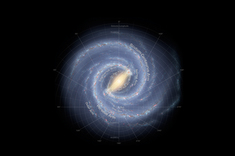Kelli Klymenko, a photographer in Sedona, took this image of the Milky Way from Cathedral Rock Trail in Arizona.
The Milky Way appears to point right at a Juniper tree in this skywatching image from Sedona, Arizona.
Kelli Klymenko , a photographer in Sedona, took the image from Cathedral Rock Trail in Arizona. It’s a familiar shot for Klymenko.
“I photographed this particular juniper a few years ago and wanted to revisit this shot under our brilliant dark skies,” she wrote in an email to Space.com. [See more amazing Milky Way photos by stargazers ]
Earth’s host galaxy, the Milky Way , is a barred spiral galaxy seen as a band of light in the night sky. It stretches between 100,000 and 120,000 light-years in diameter. It is estimated that the galaxy has approximately 400 billion stars . At the center of the galaxy lies a gigantic black hole billions of times the size of the sun.
Klymenko says she prefers to capture a moment as she experiences it, and doesn’t do too much processing afterwards. For this shot, she light-painted the tree with her phone and worked with the orange from her glowing headlamp.

0 of 10 questions complete
“The entire experimentation process is a lot of fun out in the field, especially if you don’t take yourself too seriously,” she added. “That’s the best part.” She used a Canon 5D Mark III camera; a 14mm Rokinon manual lens; 20 seconds; ISO 8000.
Editor’s note: If you have an amazing skywatching photo you’d like to share it with Space.com and our news partners for a possible story or image gallery, please contact managing editor Tariq Malik at spacephotos@space.com.
Follow us @Spacedotcom , Facebook and Google+ . Original article on Space.com .

Comments are closed.